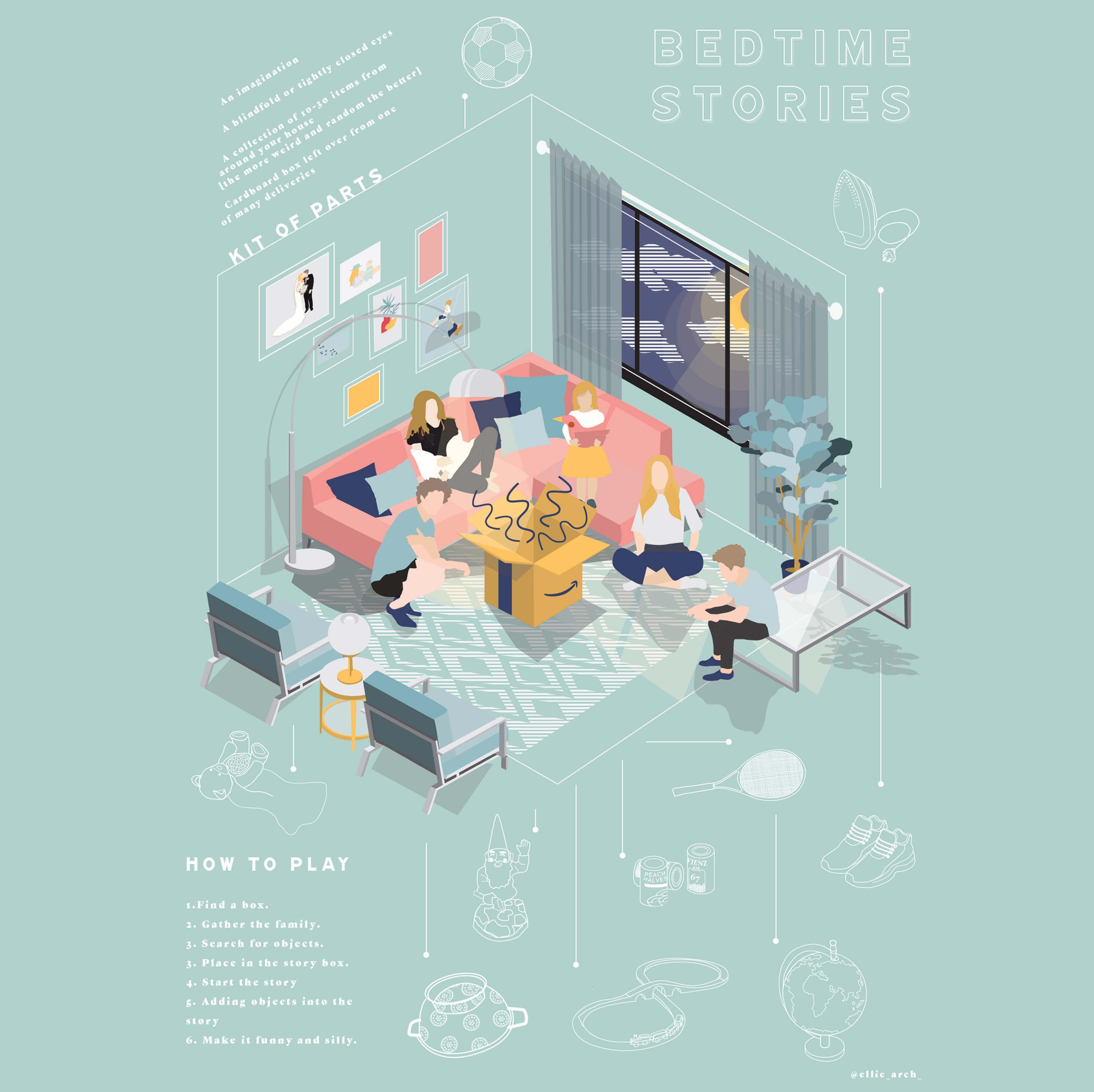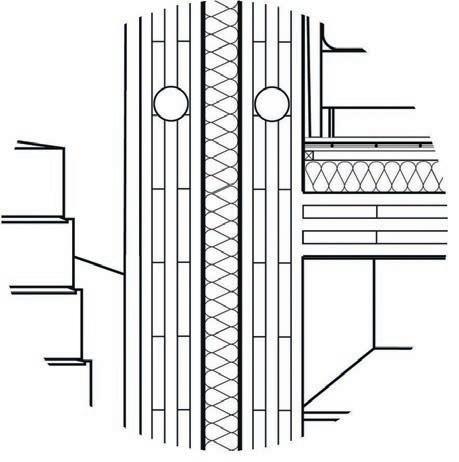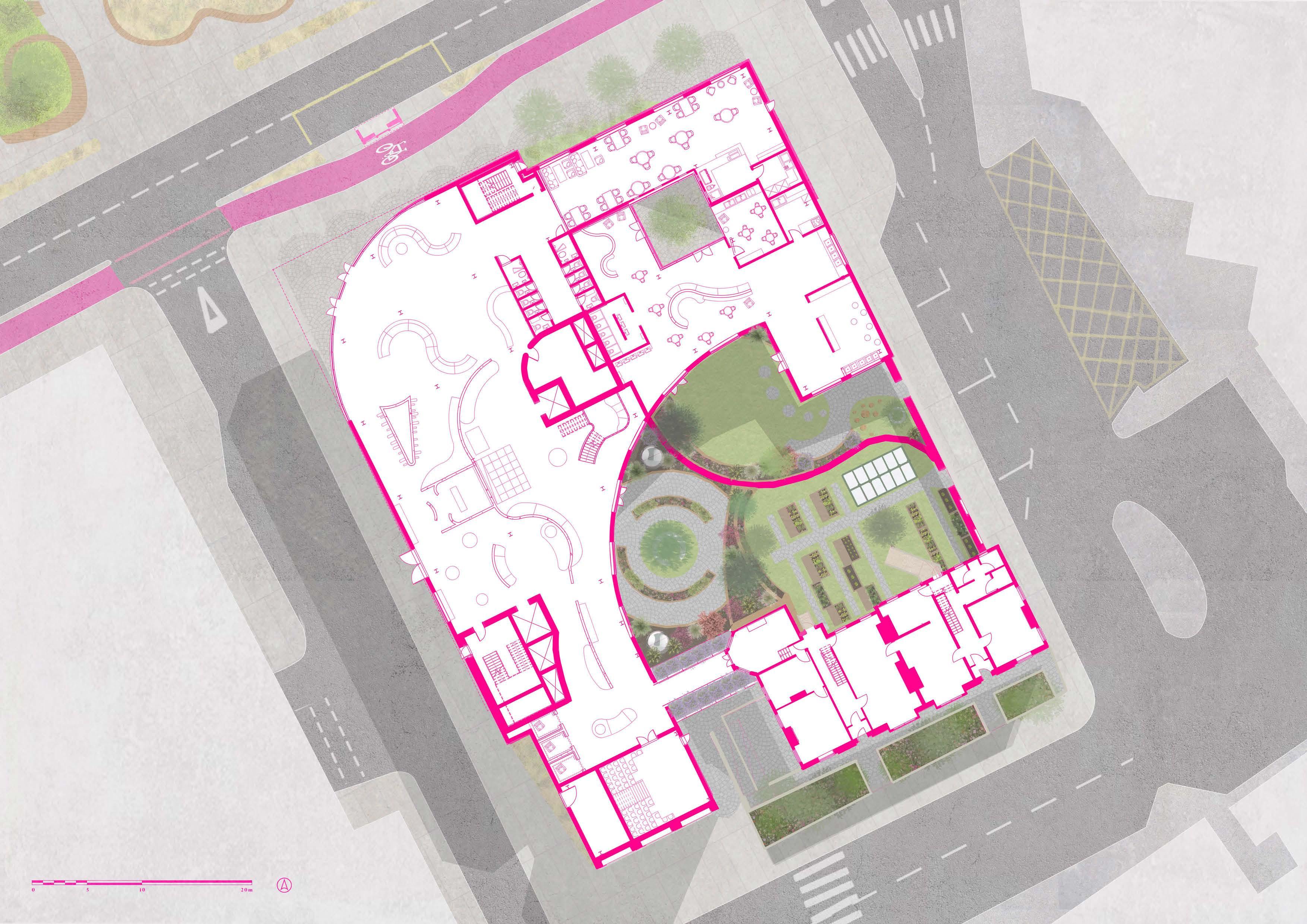

jones eleanor
email: elliearchitecture@gmail.com
telephone: 07535525060
instagram: @ellie_arch_
website: https://elliearchitecture.wixsite.com/mysite
linkedin: www.linkedin.com/in/elliejonesarchitecture
My name is Eleanor Jones. I am a Part 1 Architectural Assistant at DAY Architectural in Manchester. I recently graduated for Manchester School of Architecture with a First class honours of 85%, and was awarded the Dean’s Award for Outstanding Academic Achievement.

I have a particular interest in conservation and heritage schemes and take a sympathetic and thoughtful approach to design.
I am a hard-working individual with a tenacious attentiveness to detail. Having completed my final year of studies from home during the Pandemic I have relied upon my selfmotivation and time-keeping skills and have reaped the benefits from my work-ethic in my final year module results.
I have a good understanding of and practical capability in several CAD programmes including Revit, AutoCad, Sketch-up and Rhino and find I am able to pick up programming skills easily through the work I produce.
Outside of Architecture, I am constantly looking for ways to channel my creativity, most recently I have set up my own hand-made prints business which has taught me about the real-world of the design industry and how to strike a balance between practicality and creativity.
First
education
experience
Part 1 Architectural Assistant
DAY Architectural, Manchester
Jul ‘21 - Present
Working on multiple stages of listed and conversation projects Nationwide. Delivering application and bid documents with consistency and on keeping with company branding and image. Using complex software systems to create architectural drawings amongst existing schedules and sets adhering to company drawing styles. Assisting in concept creation and site appraisal of new and upcoming projects including restoration and refits of listed buildings.
Short Placement
Denton Corker Marshall, Manchester
Nov ‘19 - Mar ‘20
Attended frequent meetings and conducted on-site visits with Irwin Lopez; their Manchester based Partner. Attending meetings in a professional manner, and developed my understanding in the process and tasks carried out within a practice, bridging my confidence between academia and professionalism..
Internship
Allies and Morrison, London
Dec ‘17
Completing a brief individual project, alongside a team within the practice. Digital modelling using Sketchup as well as physical model making and creating presentation boards using Adobe suite, and pitching the final design to the team, in a crit-style presentation. This experience taught me a lot about the working atmosphere and enriched my understanding in the processes undertaken to complete a project.
Part-Time Work Various Roles Sep ‘15 - Present

Working in both hospitality and retail environments, handling individual tasks efficiently and working and communicating within a large team. Whilst unrelated to the field of architecture my work experience is a crucial component that has built my character, drive and self-assurance.
Highly capable using InDesign, Photoshop, Illustrator
Competent using Revit, Autocad, Sketch-up and Rhino
Interpersonal and Communication skills
Highly organised and thrive under time pressure
Building good working relationships and collaborate within a team
Creative and thoughtful approach to design
ArcDeck Radical Design Project ‘20
Awarded Top 10 in Global entries
Playhouse Competition ‘20
Awarded 2nd wave entry winner, featured in Competition book
Archisource Hometown Collective Drawing ‘20 Honourable Mention + Featured in Merchandise
Archisource: Drawing of the Year ‘20
Longlisted and Featured in Archisource annual 2020
The Dean’s Award for Outstanding Academic Achievement ‘21
Presented by The University of Manchester for consistent and remarkable academic success.
*references available upon request*




Document Interactivity
This Document uses interactivity to make it easier to navigate between the pages and to my social platforms and website.
Document Key
The numbers attached to each image are described in the corresponding caption key.

Click on each contents heading to navigate to the chosen section.
Click on the page numbers in the bottom right of each page to navigate back to this contents page.
Click on any of the hyper-linked contact details to navigate to my architecture instagram // Website // Linkedin profile // or to send me an email

The italic lines indicate which software and programmes were used to create the images
This symbol indicates Revit was used to create the image This symbol indicates Sketch-up was used to create the image




This symbol indicates AutoCAD was used to create the image

66 Baring Street, Mayfield Manchester
Located in a hidden district of Manchester’s city centre, the residential project aims to create a sustainable cyclical community tucked within an overlooked industrial landscape. The brief was to create a workspace alongside living space that was directly connected, yet distinctly separated. 66 Baring Street draws upon historic housing typologies and digests and modernises previously unsuccessful elements to create a commercial hub which sits beneath a thriving subcommunity; cultured by a cyclical residential scheme. The concept of a cyclical community originates from the age-old tradition of growing up and living one’s adult life in the same place, and being connected and identified by one’s ‘Hometown’. The mix of 1, 2 and 3 bedroom town-houses as well as accessible bungalows, and the designing of adaptable and flexible internal living spaces via swinging walls and recessing furniture creates a ‘suburb’ which is not only ecologically sustainable but also future-proofed for further generations.













Giving Back to the River
The scheme uses the adjacent River Medlock as a continuous link from the city centre through to the site. The arrangement on site is centred around a river-facing courtyard and uses a series of ‘Rain Pergolas’ that landscape this zone, whilst also taking excess rainwater from the houses, filtering and oxygenating it naturally with hanging planting and returning it back to the river.
Image Key
02-04 nternal and External Renders Sketchup// Adobe Photoshop
05 1:50 H ousing Diagram ‘A Day in the Life of a Home’ Adobe Illustrator // Photoshop
07 1:200 N orth Seasonal Elevation // Winter Revit // Adobe Photoshop

















Building Upon Precedents
The Housing design draws inspiration from historic social housing typologies in particular Deck-Access schemes of the 1960s-80s. Where these schemes fell short in giving residents pride in their homes, 66 Baring street learns from past mistakes and creates homes that are both private, flexible and welcoming, whilst using communal spaces as a foundation.







Image Key

27 1:200 Sit e Massing Model Laser Cut MDF // Plywood // Cork

28-30 De tailed Images of the Model


31 1:50n E nvironmental Strategies Section AutoCAD// Adobe Illustrator [overleaf]

32 1:20 Sit e Section Sketchup//Adobe Illustrator// Adobe Photoshop
Considering Carbon Impact
The scheme is equally environmentally considered as it is user-centric. Using a central plant room for all homes reduces energy wastage and solar panels on each home contribute to providing sustainable energy for the community. The car park at the Southern corner is clad in a greenwall mesh that acts as a carbon sequester, whilst also filtering noise from the adjacent Mancunian Way.



Competition: Radical Architecture - ArcDeck ‘20
I wanted to branch my architectural knowledge and design capabilities beyond the ‘known’ threshold of English or European sites. I had become used to the site and climate of Manchester in my previous academic projects and it was important for me to expand my abilities to respond to differing climates and context globally. The Radical Architecture competition by ArcDeck asked for an architectural design beyond the limits of practicality that explored a social or ecological transformation of a city. My project imagines Hong Kong as an epicentre of an urban-farming initiative, in which vacant roof spaces are used as farming and allotment space to provide food for the local district of the city. The scheme was inspired by the extreme human density in Hong Kong which leaves very little open land in order to farm. The city imports 80% of its essential goods, and only seven square kilometres within the city boundary is defined as farmland. The scheme is comprised of three key elements which can be prefabricated and constructed very quickly and cheaply on-site. The urban farm is connected to the urban-farm shop by means of crane in which the harvested vegetables and fruits are lowered to the street-level where local people can buy fresh and sustainable produce. Thirdly, kitchen garden ‘parasitic pods’ can be attached to existing tower block residences of the city, giving people access to their own urban gardens to grow and nurture their own ‘crops’.
My entry placed within the Top 10 Global entries and was featured on the official competition website.


Competition: HomeTownArchisource ‘20
During the spring Lockdown of 2020, I tasked myself with entering five architectural competitions in order to improve my skills in CAD modelling as well as continuing to keep my creative mind active. I surpassed my original aspiration of five entries and went on to have my work featured in several publications and win commendations and awards. I also used these entries to self-teach myself Revit and AutoCad programmes and brush up my Adobe Illustrator skills , which proved to benefit my later academic projects. The first competition I entered was the Hometown Drawing Collective, ran by Archisource, which asked for submissions of a singular illustrative isometric drawing . My drawing explores ‘the new normal’ which we were beginning to adapt to during Lockdown in the architectural envelope of the home. The envelope is distorted and unfolded to represent the multitude of purposes our homes had to serve when we were no longer able to leave them. The overlapping and layering of spaces demonstrates the complexities that everyday life and ‘not-so-everyday’ life bring to and play out upon an architectural space and how they can change completely how the space is experienced. My entry was featured in mechanise and online publications after the competition ended including a hardback book.




Competition: Playhouse - Playground Architects ‘20
During the summer I decided to work on my Adobe skills, especially Illustrator and I used my entry into the Playhouse competition as practical and creative means to wrap my head around some of the commands and tools I had been wanting to learn . The competition asked for a game design to be played within the home during Lockdown made only of things you would find around the house. My concept was for a story-telling prop box, using random collected items from around the home to invent new and silly stories. I used Illustrator to depict a home scene in which the family has gathered together to play the game. The isometric section of the living space prompted me to explore the perspective tools whilst the illustrated instructions and documents helped improve my digital drawing confidence. My entry has since featured on the competition social pages as well as in a shop window as part of the # 50 windows of MCR art ‘treasure hunt’ in Dec ‘20 and recently has been published as part of a commemorative competition book.




Competition: Drawing of the YearArchisource ‘20

Most recently I entered the Archisource Drawing of the Year competition with a 1:20 sectional detail of the 66 Baring Street project. I drew the piece as an additional revisit to the project, to explore the makings of the design in further detail, having improved my confidence and understanding of structural and technical details in the first term of Year 3. The section explores both the structural make up of the town house but also through an internal render, captures the atmosphere within the home and the layering of programme and uses by the different family members over the span of a ‘typical day’. The town houses are constructed from prefabricated CLT panels in a portal frame, using a brick-slip cladding system and featuring solar panels, a green roof plane and concrete slab foundations.
20mm BRICK SLIP PANELS SET WITHIN 10mm CAST CONCRETE (TAN AND CREAM FINISH)
50mm AIR GAP WITH STEEL BOLTS [EVERY 500mm] ATTACHING BRICKSLIP PANELS
2mm BREATHER MEMBRANE
250mm RIGID WOODFIBRE INSULATION
175mm CROSS LAMINATED TIMBER STRUCTURE
[5X35mm HORIZONTAL AND VERTICAL LAYERS]
IN A 2800mm x 3000mm PANELLISED SYSTEM

[JOINED VIA HIDDEN STEEL BOLTS] [VARNISHED AS INTERIOR FINISH]
3X 4mm GLASS [TRIPLE GLAZED OPERABLE WINDOWS] SET INTO ALUMINIUM THERMALLY BROKEN CASEMENT

100X100mm PLYWOOD CAPPING PLATE
EXPOSED CUT CLT STRUCTURE FINISH WINDOW SILL
12mm WOODEN HERRINGBONE PARQUET FLOORING [GREY WASH FINISH]
10mm SUB FLOORING WITH ELECTRIC UNDERFLOOR HEATING SYSTEM
20mm AIR GAP WITH 20x20mm WOODEN BATTENS
90mm [OPTIONAL] ACOUSTIC FOAM INSULATION [NECESSARY BETWEEN COMMERCIAL AND RESIDENTIAL SPACE]

175mm CROSS LAMINATED TIMBER STRUCTURE [5X35mm HORIZONTAL AND VERTICAL LAYERS] IN A 2800mm x 2500mm PANELLISED SYSTEM [JOINED VIA HIDDEN STEEL BOLTS] [VARNISHED AS INTERIOR FINISH]
5
12mm WOODEN HERRINGBONE PARQUET FLOORING [GREY WASH FINISH]
10mm SUB FLOORING WITH ELECTRIC UNDERFLOOR HEATING SYSTEM 2mm CONTINUOUS BREATHER MEMBRANE 400mm RIGID WOOD FIBRE INSULATION 200mm CAST CONCRETE SLAB
2mm ALUMINIUM STANDING SEAM ROOF FINISH
10mm AIR GAP (ACTING AS VAPOUR BARRIER) WITH 10x10mm WOODEN BATTENS
2mm BREATHER MEMBRANE
300mm RIGID WOODFIBRE INSULATION
175mm CROSS LAMINATED TIMBER STRUCTURE
[5X35mm HORIZONTAL AND VERTICAL LAYERS]
IN A 2800mm x 2000mm PANELLISED SYSTEM
[JOINED VIA HIDDEN STEEL BOLTS] [VARNISHED AS INTERIOR FINISH]
150mm DEEP HIDDEN ALUMINIUM GUTTER, SET INTO ROOF PLANE
2mm ALUMINIUM CAPPING
2mm BREATHER MEMBRANE
100X100mm PLYWOOD CAPPING PLATE
6X 1000x1500mm ELECTRIC SOLAR PV CELLS
3X 4mm GLASS [TRIPLE GLAZED OPERABLE SKYLIGHT] SET INTO ALUMINIUM THERMALLY BROKEN CASEMENT FED UNDER ALUMINIUM STANDING SEAM TO DAMP PROOF
100X100mm PLYWOOD CAPPING PLATE EXPOSED CUT CLT STRUCTURE FINISH
SEDUM GREEN ROOF PLANTING
80mm SOIL PLANTING LAYER
CAPPED BY 300x80mm GRAVEL DRAINAGE LAYER AND 300x300mm PLYWOOD CAPPING PLATE WITH 2mm BREATHER MEMBRANE AND 2mm ALUMINIUM STANDING SEAM FINISH
3mm ROOT BARRIER
50mm AIR GAP WITH 50x50mm WOODEN
BATTENS
2mm BREATHER MEMBRANE
300mm RIGID WOODFIBRE INSULATION
175mm CROSS LAMINATED TIMBER STRUCTURE
[5X35mm HORIZONTAL AND VERTICAL LAYERS]
IN A 2800mm x 4000mm PANELLISED SYSTEM

[JOINED VIA HIDDEN STEEL BOLTS] [VARNISHED AS INTERIOR FINISH]
150mm DEEP HIDDEN ALUMINIUM GUTTER, SET INTO ROOF PLANE
2mm ALUMINIUM CAPPING
2mm BREATHER MEMBRANE
100X100mm PLYWOOD CAPPING PLATE
100mm GEOTEXTILE DRAINAGE LAYER 450x1200mm CAST CONCRETE WALL FOUNDATION WITH 300x100mm FOOTING

6
175mm CROSS LAMINATED TIMBER STRUCTURE [5X35mm HORIZONTAL AND VERTICAL LAYERS] IN A 2800mm x 3000mm PANELLISED SYSTEM [JOINED VIA HIDDEN STEEL BOLTS] [VARNISHED AS INTERIOR FINISH]
100mm ACOUSTIC FOAM INSULATION BOLTED INTO INTERIOR WALLS
175mm CROSS LAMINATED TIMBER STRUCTURE [5X35mm HORIZONTAL AND VERTICAL LAYERS] IN A 2800mm x 3000mm PANELLISED SYSTEM [JOINED VIA HIDDEN STEEL BOLTS] [VARNISHED AS INTERIOR FINISH]
7
200X250mm CAST CONCRETE STAIR CASE 400mm CAST CONCRETE WALL [CAST MONOLITHICALLY]
50mm AIR GAP WITH STEEL BOLT [EVERY 500mm] JOINING SLIP TO WALL 20mm BRICK SLIP PANELS SET WITHIN 10mm CAST CONCRETE (TAN AND CREAM FINISH) [ENVELOPES ENTIRE CONCRETE WALL]
300mm CAST CONCRETE DECK WALKWAY FLOORING 4mm REINFORCED GLASS RAILING 8
RAW WHITE PLASTER WORK FINISH 10mm GYPSUM BOARD 80x80mm INTERIOR WALL VERTICAL AND HORIZONTAL TIMBER STUD WORK 10mm GYPSUM BOARD RAW WHITE PLASTER WORK FINISH 9
SERVICES ARE FITTED INTO PRE CUT RECESSES IN THE CLT STRUCTURE ELECTRICAL WIRING AND PLUMBING IS FED ALONG THESE CORE ROUTES
GENERAL SERVICES ARE POWERED BY ELECTRIC AND FED FROM PLANT ROOM ON SITE
THE SOLAR PANELS ATOP THE ROOFS FEED INTO THIS POWER SOURCE
Internship: Allies & Morrison, London

Alongside my studies, I also worked an internship placement at Allies and Morrison in their London office During my placement, I completed a short Charrette project based on-top of the office building, and also assisted and accompanied a senior architect working on a live project . The Charrette brief asked for a parasitic ‘stopover’ space for visiting clients or working architects at the London office, situated on top of the office building in Southwark. I was able to make full use of their in-house facilities, making a CAD model for the design a longside a physical foamboard test model At the end of my placement I was asked to present my project to the team I had been working within which I found a invaluable experience in improving my confidence in future crits and presentations. Alongside my independent project, I had the opportunity to learn about the practice processes of a live project at the time: a master-planning scheme for the BBC at Stratford Waterfront . I sat in on meetings and met with several members of the team to understand the concept and the process of stages 2 and 3: getting the design through planning
Image Key

01 I n-house model workshop used to make model (right)
02 S tratford Waterfront scheme for BBC in progress in 2017
03 S tratford Waterfront scheme for BBC as approved in 2019


04 CAD model made f or Charrette project Sketchup
05 Sit e Photo for Charrette Project (on top of the London Offices)
06-07 1:200 M odel for Charrette Projec t Foamboard







Feminist Figures, Ardwick Manchester
Located on Grafton Street, Manchester, the Feminist archive sits between two distinct campuses of the city: the University and Royal Infirmary hospital. On the site of the former home of Emmeline Pankhurst, the archive sympathetically responds to the existing narrative of the area and builds upon the existing community-serving programme of the Pankhurst centre to become a claimable space for the local community. The archive design stems from foundational theories of Feminist Urban planning and is part of a larger scheme to re-route and re-map Upper Brook street - a dangerous corridor road into the city centre west of the archive.

The archive features three internal programmes of crèche, cafe and archive exhibit to create a space that provides refuge, relaxation and learning for the deprived and disregarded area of Ardwick. A central courtyard space ties the new addition to its historic counterpart and provides and garden to local residents who may not have one; bringing together generations of the community.
The archive is built upon a cradle-to-cradle ideology in which carbon usage is minimised at all stages of the building’s lifetime and it is designed to be easily adapted or taken apart and recycled when it outgrows its purpose using a mixture of prefabrication and modular design.

03
Image Key
02 1:200 Exploded Axonometric from North-East perspective Revit// Sketchup// Adobe Photoshop

03 1:500 map - R e-routing Upper Brook Street AutoCAD // Adobe Photoshop

04 M acro-climate site analysis of the local area AutoCAD// Adobe Photoshop
05 Sit e Analysis - immediate archive site AutoCAD // Adobe Illustrator
06 Sit e Analysis - networks and connections exploded map AutoCAD // Adobe Illustrator [overleaf]
07 1:200 Eastern Night-time Facade Elevation Revit// Adobe Photoshop
02






A Claimable Space
The principals of the archive design extend from Feminist Planning theory of a claimable space in the city. The archive is traditionally a closed-off protected space. The feminist archive challenges this, giving it additional layers of programme that make it a welcoming space for the local community. The crèche gives local women a break from the balance of unpaid/paid work, whilst the reading and computer room provide resources for students and residents. The cafe is a central meeting space for the local elderly population, while the community courtyard gives green-spaces back to Ardwick: a play space for the children and a garden-away-from-home for ‘gardenless’ city dwellers.
Image Key
08 1:200 Ground Floor plan Revit// Adobe Photoshop


09 1:200 Fir st Floor plan Revit// Adobe Photoshop
10 1:200 Sec ond Floor plan Revit// Adobe Photoshop

11 1:200 R oof plan Revit// Adobe Photoshop [overleaf]
12 1:200 N orthern Facade Elevation Revit// Adobe Photoshop


Image Key
13 1:200 Western Facade Section Revit// Adobe Photoshop
14 P rogrammatic Concept Model and programme ‘stack diagram’ Sketchup // Adobe Illustrator


15 1:200 Exploded S tructural Axonometric Revit// Adobe Illustrator// Adobe Photoshop


The Active Archive


The archive intends to be in a continuous state, where local women and others can be nominated to feature in the exhibitions. It is active in the sense that it is made up of flexible exhibits that grow and evolve with current histories, and interactive exhibits that encourage visitors to share their own stories. The talk space brings in these inspirational figures for workshops and talks to actively get local women and children involved, while the crèche is linked with the archive and learning spaces to educate and bring up a new Feminist generation.
Image Key
18 Experien tial Vignette - The Archive AutoCAD// Adobe Photoshop
19 Experien tial Vignette - The Cafe - Crèche link AutoCAD// Adobe Photoshop
20 Experien tial Vignette - The Animated Facade AutoCAD// Adobe Photoshop
21 1:20 Sectional D rawing - Through Green Roof/ Brick Slip Cladding AutoCAD // Revit // Adobe Photoshop








Image Key
22 nternal Render - The Archive Entrance Sketchup// Adobe Photoshop
23 I nternal Render - The Courtyard Garden Sketchup// Adobe Photoshop
24 nternal Render - The Crèche Sketchup// Adobe Photoshop


25 I nternal Render - The Talk Space Sketchup// Adobe Photoshop


26 1:5 De tail - Flat Roof AutoCAD
27 1:5 De tail - Brick Slip Cladding Wall AutoCAD
28 1:5 De tail - Internal Floors AutoCAD
29 1:5 De tail - Green Roof AutoCAD
30-32 D iagrams Exploring the Potential uses of the Flexible Space Hand Drawn // Adobe Photoshop

The Wider Picture
The archive’s outreach extends beyond its internal programme, enveloped in urban planning changes that make both the site and the city more accessible for those living in Ardwick. The project aimed to bridge between the busy city campuses and the forgotten suburbs and create a claim-able community space, and simultaneously to rethink the routes that connect the two zones of the city to be safer, more accessible and cyclist friendly.

Image Key
33 1:1250 Sit e Strategy Axonometric AutoCAD// Revit // Adobe Photoshop
34 1:20 Sectional M odel - Polycarbonate CladdingDaytime [made at home]

tracing paper // wooden dowels // greyboard
Adobe Photoshop post production
35 1:20 Sectional M odel - Polycarbonate CladdingNightime [made at home]
tracing paper // wooden dowels // greyboard Adobe Photoshop post production

36 1:100 Day in the Lif e of the Archive - Animated Section AutoCAD// Adobe Photoshop

thank you.
email: elliearchitecture@gmail.com
telephone: 07535525060
instagram: @ellie_arch_ website: https://elliearchitecture.wixsite.com/mysite linkedin: www.linkedin.com/in/elliejonesarchitecture
